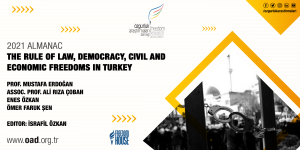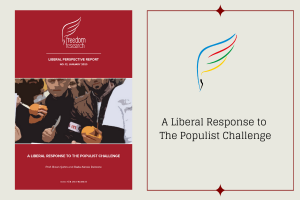Executive Summary
Freedom Research Association has been identifying and developing solution proposals to the existing problems in the relevant institutions within the scope of the “Structural Reforms Project in Turkey”. The report titled “Restructuring of the Execution and Administration in Turkey”, prepared by Mustafa Erdogan, focuses on restructuring executive and public administration in accordance with the changing conditions and new requirements.
The problems with the structure and functioning of the “government”, which constitutes the political branch of the executive, are mainly sourced by the Authoritarian-Presidential system that started to be implemented in the summer of 2018. The new system, which ties all the executive with its political and administrative branches to the will of a single person, has negative effects on the function of the public administration. Other major problems with organization and functioning are long-standing chronic problems of the administration.These are essentially the excessive centralization of the administrative structure, its bloated and disorganized structure, the lack of efficiency and effectiveness, and the disorganization of the personnel regime; related to the authoritarian and closed structure of administration.
The suggestions are presented under the following headings: Central administration organization, public organizations and organizations about professions, local governments, public personnel regime, independent administrative authorities, public procurement regime, and inspection of the administration. In the conclusion part, it is emphasized that the restructuring of the Turkish public administration has now become a necessity for responsible political decision-makers and that determination should be shown in the structuring by taking advantage of the consensus and determination that has emerged in the country regarding the government system change.
Based on all these, it is possible to summarize the problems related to executive and administration in Turkey under two headings: “Traditional Problems” and “Problems Brought by the New System of Government”. Traditional problems within the public administration are as follows:
1- Extreme centralization of the executive: Although the public administration is separated from the central and local administration in the constitution, local administrations do not have enough initiative and freedom inside their jurisdiction.
2- Organizational and functional disarray of the administration: Numerous public institutions and organizations with varying degrees of autonomy from central administration, and with new ones added every day, make decisions that conflict with each other. This situation is not compatible with the unity of the administration.
3- Dual structure of the local organization: Both the central administration’s provincial organization and local government bodies serving simultaneously lead to both wastage of resources and confusion in the execution of public services.
4- Complex personnel system of the public administration: The diversity of statuses such as civil servants, contracted personnel, and workers create differences in rights and duties among those who carry out public service.
5- Professional organizations with the status of public institutions: The existence of these organizations leads to the unnecessary expansion of an already extensive and complex public administration, and the creation of a private interest network on the margin of the state.
6- Public procurement regime: Due to many large-scale public purchases being exempt from the Public Procurement Law and frequent changes being made to the laws, public procurement processes are not conducted transparently and impartially. It should not be forgotten that decisions are largely influenced by political power in practice.
7- Financial audit of public administration: The lack of provision for a qualified majority in the selection of members of the Court of Accounts allows the ruling political party in the Grand National Assembly to determine the members of the Court. Therefore, in practice, public spending cannot be effectively audited.
The problems arising from the personal management approach and implementation brought about by the new government system are discussed under the following headings:
1- Escape from initiative and responsibility by all public officials, including ministers: Obtaining permission or approval from the President on every issue results in the cumbersomeness, inefficiency, and delay of state administration.
2- Frequently changing regulations in the executive and administration: Repeated regulations to correct mistakes lead to instability in governance contrary to promises, and this patchwork system results in the arbitrary ruling.
3- Loyalty and gratification race in bureaucracy: The concentration of all power in one person in the executive and administration causes public officials to disregard rules and weakens the impartiality of bureaucracy.
4- Not prioritizing competence and merit in bureaucracy: The sentiment that “the president, who represents the will of the people, is doing the right thing, let us trust him” weakens the sensitivity of public officials to comply with the law and prevents openness, competence, merit, and transparency in public administration and governance.
5- Public insensitivity and irresponsibility: The emphasis on loyalty to the president, who is assumed to represent the “national will” in their duties, is leading public servants to adopt an attitude that does not prioritize whether or not they satisfy the citizens in their services.
6- Strengthening of authoritarian tendencies in the President: A president who assumes he can do anything without considering what the law says since he was elected by the people will not hesitate to violate the law with this psychological and behavioral orientation.
7- The problem turns into a regime issue that concerns the entire state system: The problem of Turkey has moved beyond the narrow scope of the executive and administration, with the weakening of the legislative body against the president and the deficiency and inefficiency of checks and balances mechanisms, and has turned into a regime problem.
8- No political inspection over the executive: The shift from a parliamentary system to a presidential regime has reduced the legislature’s ability to inspect the executive, and the remaining control mechanisms have been weakened to be ineffective.
All of these maintain the pre-modern administration mentality based on personal loyalty, which is incompatible with the “democratic rule of law” ideal and the effective management principle. To overcome this problem, in light of the observations and evaluations included in the previous headings, our recommendations for the restructuring of the executive and administration in Turkey can be stated as follows:
1- Government System Change: The authoritarian-presidential government system must be abandoned. Legislative-executive relations should be restructured in accordance with “rationalized parliamentarian” and democratic governance.
2- Adoption of New Principles in Public Administration: Administrative organizations with simple and functional integrity, decentralization, equality and impartiality in entry into public service and service provision, proximity to citizens in service delivery, citizen participation, effectiveness and quality in service, transparent and accountable governance, adherence to the rule of law, and effective judicial review should be prioritized.
3- Simplification of Central Administration Structure: Ministries and sub-units that cause both resource waste and conflicting practices should be eliminated, and the unnecessarily inflated number of ministries should be reduced. The Ministry of Culture, the Directorate of Religious Affairs, and the National Security Council should be abolished.
4- Regulation in Public Institutions and Professional Organizations with Public Institution Status: Except for those that truly require the quality of public legal personality for the service they provide, others should be included in relevant ministry organizations or transferred to local governments. TRT, RTÜK, public institutions with economic enterprise qualities, and professional organizations, except for bar associations and medical chambers, should be abolished. The Atatürk Culture, Language, and History High Institution should be under one or several state universities.
5- Strengthening Local Governments: Besides the services to be taken over from the central government and the powers they require, local governments should be equipped with wider taxation and independent budget authority. In addition, the practice of local government decision-making bodies being dismissed by the central government and replaced by appointments from the central government should be ended.
6- Preparation of the Administrative Procedure Law: There is no compact regulation that links the processes of public administration to uniform general rules. This situation should be addressed by a general administrative procedure law to be prepared by the legislative body.
7- Reforming the Public Personnel Regime: It has become necessary to measure the competence and merit of those applying to public administration through objective criteria-based exams. A policy that takes diversity and pluralism into consideration should also be followed in the recruitment of public officials. The unnecessary number of public personnel should be reduced, and the public personnel regime should be made uniform by law.
8- Selection of Heads of Independent Administrative Authorities through Election: In independent administrative authorities such as the Central Bank, which serves as almost a state function in the formation of public policy, appointments to their top management should be subject to approval by a qualified majority in the Parliament for neutrality and democratization.
9- Reform of the Public Procurement Regime: High-volume procurements subject to exception should also fall under the scope of the Public Procurement Law. Changes to the procurement law should constitutionally be subject to a qualified majority requirement, and legal measures to protect the procurement commissions should be taken.
10- Functionalization of the Inspection of Administration: The members of the Court of Accounts, which carries out the financial inspection of the public administration, should be elected by the Grand National Assembly of Turkey with a qualified majority, as provided by the Constitution. The President of the Court of Accounts should be elected by its members, not by the Parliament. In addition, the effective and impartial performance of the Public Oversight Authority should be ensured by legal regulations.





